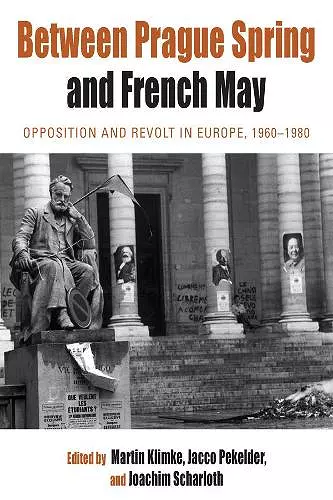Between Prague Spring and French May
Opposition and Revolt in Europe, 1960-1980
Joachim Scharloth editor Martin Klimke editor Jacco Pekelder editor
Format:Paperback
Publisher:Berghahn Books
Published:1st Aug '13
Currently unavailable, and unfortunately no date known when it will be back

Abandoning the usual Cold War–oriented narrative of postwar European protest and opposition movements, this volume offers an innovative, interdisciplinary, and comprehensive perspective on two decades of protest and social upheaval in postwar Europe. It examines the mutual influences and interactions among dissenters in Western Europe, the Warsaw Pact countries, and the nonaligned European countries, and shows how ideological and political developments in the East and West were interconnected through official state or party channels as well as a variety of private and clandestine contacts. Focusing on issues arising from the cross-cultural transfer of ideas, the adjustments to institutional and political frameworks, and the role of the media in staging protest, the volume examines the romanticized attitude of Western activists to violent liberation movements in the Third World and the idolization of imprisoned RAF members as martyrs among left-wing circles across Western Europe.
“The well-footnoted chapters are based on extensive research. There is an extensive bibliography and a 25-page chronology of events in 1968.”· Choice
“This collection of thought-provoking essays on the protest movements in Europe in the 1960s and 1970s—from Britain, Germany, France and the Nordic countries in the west to Romania, Czechoslovakia and Yugoslavia in the east—shows the advantages of a multidisciplinary, transnational approach to the study of mass protest. At the end of the book is a handy chronology of important events and a comprehensive bibliography. The well-referenced Introduction provides useful background information on the political atmosphere in both Western and Eastern Europe in the period.”· European Legacy
“This volume offers many new insights into the complex history of 1968 on both sides of the Iron Curtain, bringing awareness to developments in smaller countries such as Yugoslavia, Denmark, and Norway that are usually omitted in existing literature. These essays should assist scholars studying Europe in the postwar period to transcend reductionist national narratives. The seventh volume of the Protest, Culture, and Society series is another welcome contribution to a much-needed and more comprehensive view of historical and cultural change in Europe around the mystical year of 1968.”· Journal of Cold War Studies
“A wonderful work of collaborative and comparative history, truly international in scope. The authors teach at universities in nine different European nations, plus the United States and Japan. (…) The book will be of immense value to a wide range of specialists and can also be profitably read by anyone who lived through and wants to understand better the excitement, pain, trauma, and occasional triumphs of 1968, looking backward to 1960 and ahead to 1980 to place that extraordinary year in perspective.“· David L. Schalk, William R. Kenan, Jr. Professor of History, Emeritus Vassar College
“This volume is a very good contribution to historical studies, and for the study of transnational protest movements. Its strength derives from the variety of cases presented and from its focus on sub- or nonstate actors in a good selection of European countries.”· Memory Studies
“…[uses] a wide range of disciplines, including linguistic analysis of the transmission of protest language… The vast array of different approaches is at times dizzying, but contributes to a remarkable survey of the social reality of the period. These [essays] also confront one of the more unpleasant aspects of the movements of the era – their relationship to armed struggle… The scholars included here confront this history in all its messy and sometimes unpleasant detail. The result is a bold reappraisal of the sometimes naïve, sometimes dangerous, but always courageous confrontation of one generation with the world it was meant to inherit.”· Comparativ. Leipziger Beiträge zur Universalgeschichte
“Too often the protests of the 1960s are narrowly confined to the events of one year – 1968 – or to the same familiar set of countries. This welcome book offers broader vistas that includes European countries, big and small, from both sides of the Iron Curtain. In doing so, the authors allow us to transcend worn national narratives and reflect more broadly on how a whole continent was changed by the promise of global change and revolution. This book is thus an important addition for anyone seriously studying Europe in the postwar period.”·James C. Kennedy, Author of Building New Babylon: The Netherlands in the 1960s, Professor of Dutch History since the Middle Ages, University of Amsterdam
ISBN: 9781782380511
Dimensions: unknown
Weight: 476g
356 pages